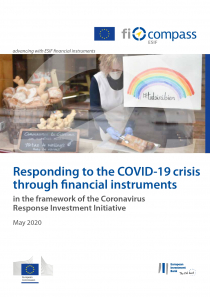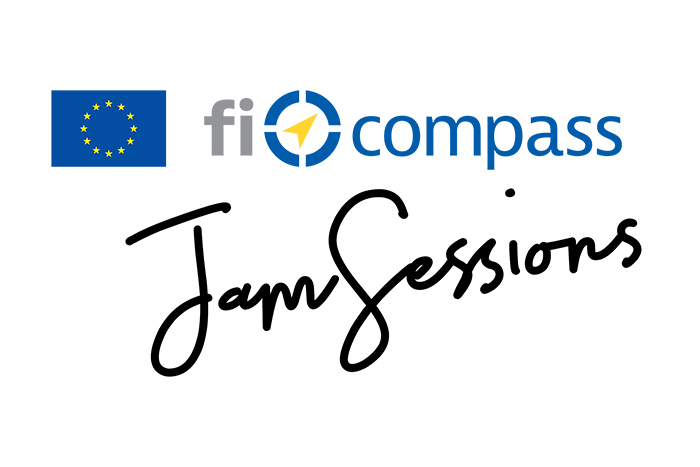The European Commission – DG REGIO, DG AGRI and DG EMPL in partnership with the European Investment Bank (EIB) organised on 11 May 2020 the first webinar on ‘ESIF financial instruments under the Coronavirus Response Investment Initiative’. Over 500 participants from managing authorities, financial intermediaries, EU institutions and other ESIF stakeholders joined the webinar, which was organised to shed light on the new flexibilities for ESIF financial instruments under the Coronavirus Response Investment Initiative (CRII) and CRII Plus. The measures include amendments to the Common Provisions Regulation 1303/2013 (CPR), ERDF and EAFRD regulations and the State aid Temporary Framework.
Jonathan Denness, from DG REGIO, opened the webinar announcing that the European Commission launched, in a very short period, two packages of measures: the Coronavirus Response Investment Initiative (CRII) and CRII Plus. These measures mobilise cohesion policy to respond to the rapidly emerging needs in the most exposed sectors, and help Member States to address three priorities: spending on healthcare, support to short time work schemes and support to the SMEs working capital.
Loris Di Pietrantonio, from DG EMPL, explained that no amendments were introduced for ESF specific regulation and that the CPR novelties apply also to ESF financial instruments. 17 Member States have already conceived national schemes for short time work arrangements and rely on ESF resources to roll them out, thereby stemming the COVID-19 fallout on the labour market. Short time work arrangements were eligible under ESF, provided that they were matched with active measures such as training and job placement. Following the COVID-19 outbreak, short time work arrangements can now be supported without any specific matching measure, under the Thematic Objective 9 (Social inclusion and access to services). Furthermore, ESF can play a role in supporting the hiring costs of staff involved in the health sector, in the production of medical devices and equipment.
Michael Pielke, from DG AGRI, informed that in the current programming period, EAFRD financial instruments could support only working capital linked to investments. However, in the current crisis, EAFRD financial instruments will also be eligible to support farmers facing economic difficulties, through standalone working capital. This measure was already proposed for the post-2020 CAP and has been brought forward to contribute to the response by EAFRD managing authorities to the COVID-19 outbreak.
 Frank Lee, from the EIB, highlighted that the fi-compass factsheet ‘Responding to the COVID-19 crisis through financial instruments’ aims to assist the mobilisation of ESIF financial instruments, including in combination with grants. The factsheet is also meant as an inspiration for managing authorities, National Promotional Banks and Institutions (NPBIs) and other stakeholders to use ESIF financial instruments and learn from the existing examples.
Frank Lee, from the EIB, highlighted that the fi-compass factsheet ‘Responding to the COVID-19 crisis through financial instruments’ aims to assist the mobilisation of ESIF financial instruments, including in combination with grants. The factsheet is also meant as an inspiration for managing authorities, National Promotional Banks and Institutions (NPBIs) and other stakeholders to use ESIF financial instruments and learn from the existing examples.
To respond quickly to the COVID-19 crisis, the amended CPR introduces new flexibilities for the implementation and use of financial instruments to help provide an effective response to the outbreak. Ieva Zālīte, form DG REGIO, introduced some of key flexibilities available to managing authorities, NPBIs and their partners. These include the relaxation of the requirement to modify ex-ante assessments when adapting existing financial instruments to respond to the crisis, the new rules related to the support of working capital and the State aid Temporary Framework.
The webinar featured two examples of measures implemented to respond to the COVID-19 outbreak. Ivan Lesay, from the Slovak Investment Holding, explained how the financial instrument ‘SIH Anti-Corona Guarantee’, recently launched in Slovakia to alleviate economic hardships faced by SMEs as a result of the measures to contain the spread of COVID-19, was implemented. Also Poland adopted measures in response to the crisis. Aleksandra Kwiatkowska, from Bank Gospodarstwa Krajowego, presented the variations introduced to the financial instrument ‘National Fund for Social Entrepreneurship’ in order to improve the borrowing and repayment conditions for final recipients. Both examples highlighted how financial instruments could be mobilised to quickly respond to SMEs needs of businesses in Member States. As such, these examples could be regarded as a source of inspiration for managing authorities (MAs) and NPBIs.

The webinar concluded by a Q&A panel during which experts from DG REGIO, DG EMPL and DG AGRI as well as from the EIB responded to questions submitted by the attendees. We invite you to listen to this session in the webinar video recording in the next section of this page.
A number of questions were also raised by participants in writing. These questions, together with a response prepared by experts from the European Commission have been used to produce the Written Q&A document available below alongside the webinar video.
Axel Badrichani, from DG REGIO, closed the webinar inviting participants to submit additional questions related to ESIF financial instruments under the CRII/CRII Plus by using DG REGIO’s functional email REGIO-B3-FINANCIAL-INSTRUMENTS@ec.europa.eu.
![]() presentation
presentation
![]() audio
audio
![]() video
video
![]() case study
case study
The audio in the video files is in original language of the speakers. The English interpretation is available as audio files.
| Title | Speakers | ||
|---|---|---|---|
| |
The EU response to COVID-19 outbreak |
Introduction by: Bruno Robino, Head of fi-compass, European Investment Bank Jonathan Denness, Head of Financial Instruments and International Financial Institutions Relations Unit, DG REGIO, European Commission Loris Di Pietrantonio, Head of Unit, DG EMPL, European Commission Michael Pielke, Head of Unit, DG AGRI, European Commission Frank Lee, Head of Financial Instruments Advisory Division, European Investment Bank |
|
| |
The CRII and CRII Plus legislation and other regulatory initiatives | Ieva Zālīte, Policy Officer, Financial Instruments and Relations with International Financial Institutions Unit, DG REGIO, European Commission |
|
| |
Slovak Investment Holding Anti-Corona Guarantee | Ivan Lesay, Chief Executive Officer, Slovak Investment Holding |
|
| |
ESF financial instruments against COVID-19 in Poland | Aleksandra Kwiatkowska, Director of the Unit, European Programmes Department, Bank Gospodarstwa Krajowego |
|
| |
Q&A to panel | Oana Dordain, Policy Officer, Financial Instruments and Relations with International Financial Institutions Unit, DG REGIO, European Commission Ieva Zālīte, Policy Officer, Financial Instruments and Relations with International Financial Institutions Unit, DG REGIO, European Commission Krzysztof Kasprzyk, Policy Officer, Financial Instruments and Relations with International Financial Institutions Unit, DG REGIO, European Commission Petr Lapka, Deputy Head of Unit, DG AGRI, European Commission Szilvia Bencze, Policy Officer, DG AGRI, European Commission Andrea Leruste, Deputy Head of Unit, DG EMPL, European Commission Andrea Da Pozzo, Policy Officer, DG EMPL, European Commission Desmond Gardner, Financial Instruments Advisor, European Investment Bank |
|
| |
Closing remarks | Axel Badrichani, Deputy Head of Financial Instruments and International Financial Institutions Relations Unit, DG REGIO, European Commission Closing by: Bruno Robino, Head of fi-compass, European Investment Bank In case of additional questions related to ESIF financial instruments under the CRII, please contact: REGIO-B3-FINANCIAL-INSTRUMENTS@ec.europa.eu |

